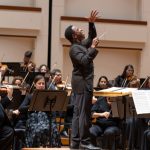February 27, 2024
Emerson Hall, Schwartz Center for Performing Arts
Atlanta, GA – USA
“Listen: Works by Women 20240-Myth and Nature”
Christina Smith, flute & alto flute; Emily Brebach, oboe and English horn; Marci Gurnow, clarinet & bass clarinet; Jessica Oudin, viola; Elisabeth Remy Johnson, harp.
Clarice ASSAD: The Book of Spells
Amy BEACH: Berceuse
Ruth GIPPS: Sea-shore Suite, Op. 3b
Danielle Eva SCHWAB: Breathing Underwater
Jennifer HIGDON: The Sound of Light
Leilehua LANZILOTTI: meridian
Soon Hee NEWBOLD: Alis Volat Propriis (world premiere)
Mark Gresham | 1 MAR 2024
In the realm of classical music, where tradition often overshadows innovation and new directions, The Merian Ensemble has emerged as one of Atlanta’s beacons of change.
Established in 2018 by five distinguished women musicians from the Atlanta Symphony Orchestra (Christina Smith, flute/alto flute; Emily Brebach, oboe/English horn; Marci Gurnow, clarinet/bass clarinet; Jessica Oudin, viola; Elisabeth Remy Johnson, harp), this chamber music group set out on a bold mission: to elevate the prominence of women composers in the concert repertoire and redefine the historical narrative with a blend of virtuosity and advocacy.
Through their “Listen: Works by Women” initiatives, The Merian Ensemble showcases the rich tapestry of music crafted by women and actively fosters the creation of new compositions. The latest installment of these initiatives, subtitled “Myth and Nature,” came this last Tuesday to Emerson Hall, Schwartz Center for Performing Arts, on the campus of Emory University as one of the Department of Music’s Faculty Artist Affiliate recital series.
The full roster of the group opened the program with The Book of Spells (2020) by Clarice Assad, which delves into the realms of magic, witchcraft, and fantasy, with each movement inspired by specific rituals to achieve various goals.
The piece is composed in three movements or “chapters” exploring different rites drawn from what the composer describes as “a book I came across.” (One might wager a guess that tome is the eponymous The Book of Spells: The Magick of Witchcraft by the shamanic priestess Jamie Della.) Each movement of The Book of Spells corresponds to a specific rite outlined in the book, with thematic chapters focusing on matters of the heart, wealth and prosperity, and health and well-being.
Unfortunately, the program booklet contained no written notes (though musicians made some spoken statements from the stage, which were not always audible). But the composer explains in her online notes about the piece, “I have long been intrigued by anything unexplained with pure logic, so occult themes, witchcraft, and the fantasy world have long been companions of my imagination.”
Three compositions for smaller performing forces followed.
Gurnow and Johnson played the lyrical “Berceuse” (No. 2 from Three Compositions for Violin and Piano, Op. 40), transcribed for clarinet and harp by Johnson, who was next joined by Brebach for the three-movement Sea-shore Suite, Op. 3b, by Ruth Gipps, for oboe and piano, with the piano part again adapted for harp by Johnson.
To round out the first half, Smith and Oudin joined Johnson for Breathing Underwater by Danielle Schwob. Not a surprising instrumentation: The combination of flute, viola, and harp has increased in popularity as a standard chamber music ensemble since Claude Debussy’s Sonata for Flute, Viola, and Harp (1915), although other composers had written for it earlier.
All five of the musicians in The Merian Ensemble would return to the stage to play as a quintet in all of the works on the program’s second half: Jennifer Higdon’s The Sound of Light, Leilahua Lanzilotti’s meridian (the lower case title is correct), and to cap off the concert, Alis Volat Propriis (“She Flies With Her Own Wings”) by Soon Hee Newbold, an actress/musician with a long list of educational works for school-level string orchestra in her catalog as composer.
That is where some uncertainty comes in, as Alis Volat Propriis is billed in the printed program as a world premiere, commissioned for The Merian Ensemble by the Atlanta Symphony Orchestra. Yet, an existing Alis Volat Propriis by Newbold, for string orchestra with an optional harp, has already been published by Alfred Music.
Is what we heard the same work transcribed for Merian Ensemble from the published version? That would be the immediate assumption. But again, there are no further notes in the booklet, and none are to be found online. Nevertheless, it is an attractive piece that makes for easy listening with folk-infused flavors that blend a hint of Asian ethnicities with a dose of Vaughan Williams’ English folk musings, every bit as skillfully-played as the other six works on the program. ■
EXTERNAL LINKS:
- The Merian Ensemble: aso.org/artists/detail/the-merian-ensemble

Read more by Mark Gresham.
RECENT POSTS
 Luisi and Dallas Symphony revel in Respighi, Bruce Liu excels in Saint-Saëns’ ‘Egyptian’ Concerto • 13 Oct 2025
Luisi and Dallas Symphony revel in Respighi, Bruce Liu excels in Saint-Saëns’ ‘Egyptian’ Concerto • 13 Oct 2025 Kwamé Ryan and the Charlotte Symphony, with violinist Gil Shaham, deliver a rapturous all-Tchaikovsky evening • 11 Oct 2025
Kwamé Ryan and the Charlotte Symphony, with violinist Gil Shaham, deliver a rapturous all-Tchaikovsky evening • 11 Oct 2025




.png)